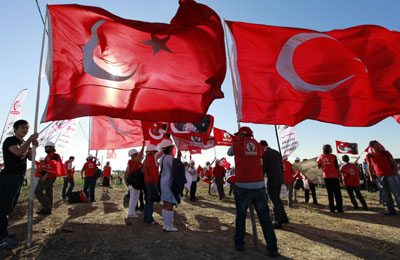
Turkish court begins sentencing in plot trial
Silivri, Turkey, August 5, 2013
A Turkish court on Monday began sentencing nearly 300 defendants accused of plotting to overthrow the government, handing prison sentences of up to 20 years to some and acquitting 21 others in a case that has exposed deep divisions in the country.
The court was announcing the verdicts individually. Verdicts on high-profile defendants including former armed forces commander Ilker Basbug were yet to be announced.
Earlier, security forces fired tear gas in fields around the courthouse in the Silivri jail complex, west of Istanbul, as defendants' supporters gathered to protest against the five-year trial that has become a battle between Prime Minister Tayyip Erdogan and the secularist establishment.
Prosecutors say an alleged network of secular arch-nationalists, code-named Ergenekon, pursued extra-judicial killings and bombings in order to trigger a military coup, an example of the anti-democratic forces which Erdogan says his Islamist-rooted AK Party has fought to stamp out.
Critics, including the main opposition party, have said the charges are trumped up, aimed at stifling opposition and taming the secularist establishment which has long dominated Turkey. They say the judiciary has been subject to political influence in hearing the case.
"This is Erdogan's trial, it is his theatre," Umut Oran, a parliamentarian with the opposition CHP party, told Reuters.
"In the 21st century for a country that wants to become a full member of the European Union, this obvious political trial has no legal basis," he said at the courthouse.
Erdogan has denied interfering in the legal process, stressing the judiciary's independence. But he has criticised the prosecutors handling the case and expressed disquiet at the length of time defendants have been held in custody.
With main access roads shut and protesters' buses prevented from reaching the area, hundreds of the defendants' supporters attempted to cross fields to reach the court and prison complex, but police with riot shields blocked their advance.
"The day will come when the AKP will pay the price," some chanted on the approach road to Silivri, where hundreds of riot police and gendarmes, a paramilitary force responsible for rural security, were on duty.
Among the 275 defendants accused in the case are retired General Basbug and other military officers, politicians, academics and journalists. They deny the charges.
"STAIN" ON HISTORY
Basbug criticised the court in comments published on his Twitter account on Sunday, saying the public would not accept the punishment of innocent people.
"The 'court' will announce its verdict in an atmosphere that was not even seen in times of martial law, with even families being banned from coming," he wrote. "They know they will smear a black stain on the glorious history of the Turkish state and army like never before."
The threat of a coup is not far-fetched: the secularist military staged three coups in Turkey between 1960 and 1980 and pushed the first Islamist-led government out of office in 1997.
But Erdogan has gradually chipped away at the army's influence since his AK Party first came to power in 2002, including in the courts with the Ergenekon case and the separate "Sledgehammer" plot.
Last September, the court in Silivri sentenced more than 300 military officers to jail on charges of plotting to overthrow Erdogan a decade ago in "Sledgehammer".
The government's control over NATO's second largest army was clearly illustrated on Saturday when Ankara appointed new military commanders in an overhaul of its top ranks, forcing the retirement of a senior general regarded as a government critic.
The Turkish public initially widely welcomed the trial on the grounds it would bring to account the country's "Deep State" - an undefined network of secularists long believed to have been pulling the strings of power in Turkey.
As the trial advanced criticism grew, however. The European Commission has also expressed concern.
"We were all happy when this court case started because we thought it was an effort to clean up the Deep State. But we soon realised it was an effort to clean up political opponents," said Nedim Sener, an investigative journalist accused of links to Ergenekon and still on trial in a related case. - Reuters







